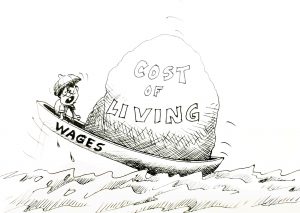In our country and some parts of the world, salaries hardly increase, taking a long time to do so while the cost of commodities on the other hand is constantly soaring high—a growing concern for the majority of families and individuals. This issue reflects a significant imbalance between people’s income and the prices of essential goods and services.
The stagnant salaries in relation to the rising cost of commodities can understandably be attributed to various factors such as inflation, globalization, and technological advancements. Inflation, for instance, leads to an increase in the prices of goods and services, thereby lessening the purchasing power of individuals. Globalization meanwhile enables companies to outsource labor to lower-cost countries, resulting in reduced wages for workers in highly developed nations. Technological advancements, on the other hand, led to automation and job displacement, further contributing to the stagnation of salaries.
The impact of this phenomenon goes beyond mere financial constraints for individuals. It can also have far-reaching consequences on the overall economy and social welfare. With the failure of salaries to keep pace with the cost of living, individuals struggle to meet their basic needs and maintain a decent standard of living. This, in turn, leads to decreased consumer spending, lower economic growth, and increased income inequality.
Such disparities between salaries and the cost of commodities aggravate the existing social inequalities and hinder social mobility. Those with higher incomes may be able to bear the rising prices more easily, but low-income individuals and families are forced to make difficult trade-offs and sacrifices. This perpetuates the cycle of poverty and limits opportunities for upward mobility, ultimately stifling economic progress and social cohesion.
This issue of salaries hardly increasing while the cost of commodities soar high requires immediate solutions. Hungry stomachs cannot wait. We already cited some causes and consequences of this trend, and the government must advocate for policies and initiatives that promote fair wages, economic stability, and social equity.




